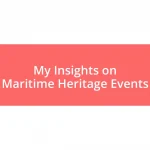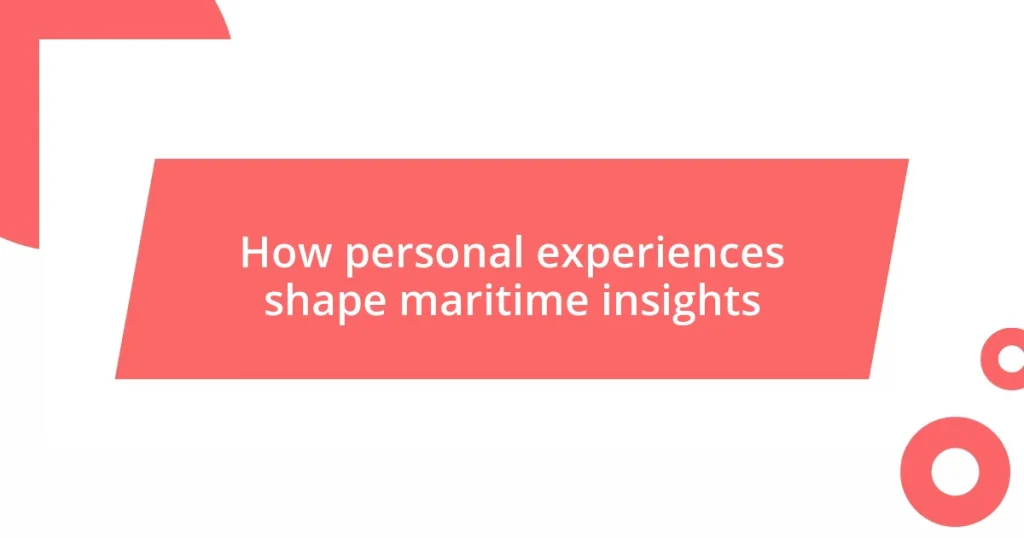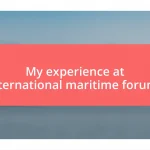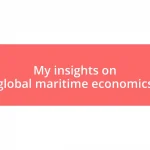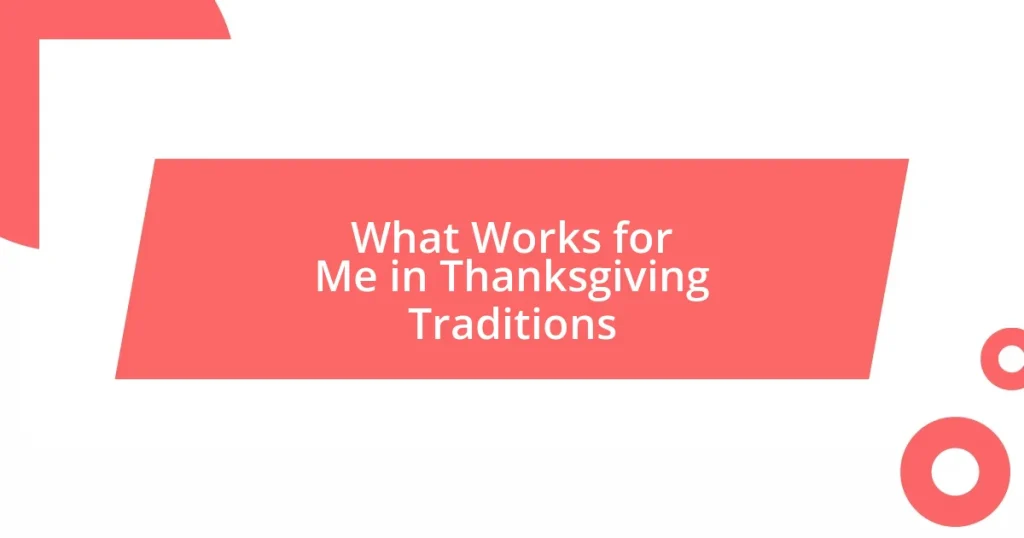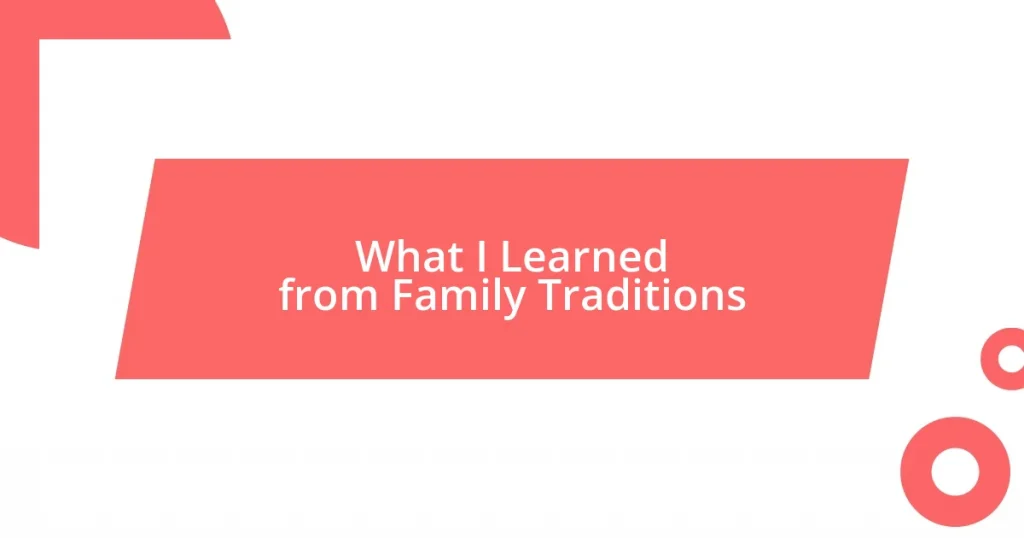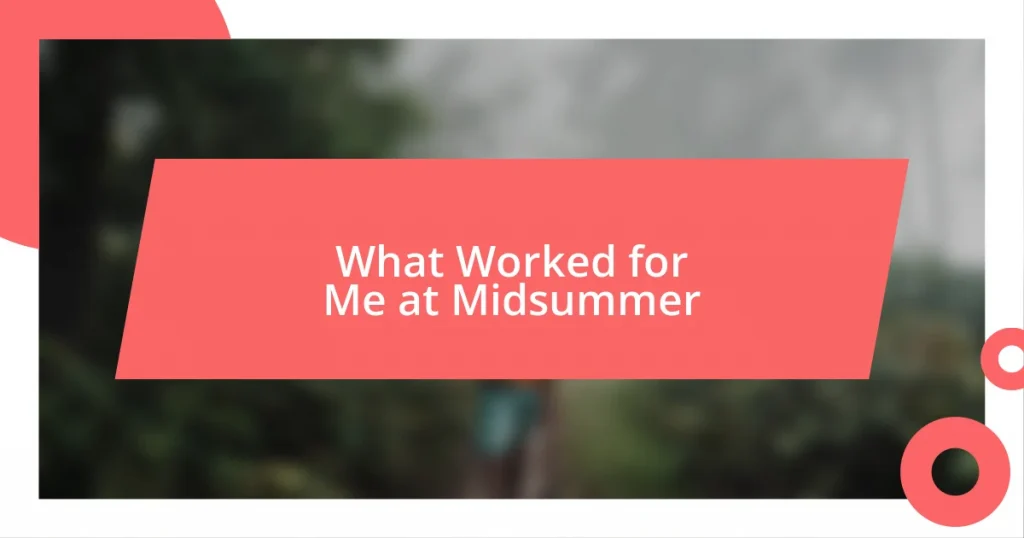Key takeaways:
- Personal maritime experiences, including mistakes and challenges, shape skills, resilience, and understanding of the sea.
- Emotional connections to the ocean enhance appreciation and learning, creating a profound impact on mariners’ perspectives.
- Future maritime decision-making will increasingly rely on data-driven strategies, AI, and collaborative approaches to enhance safety and efficiency.
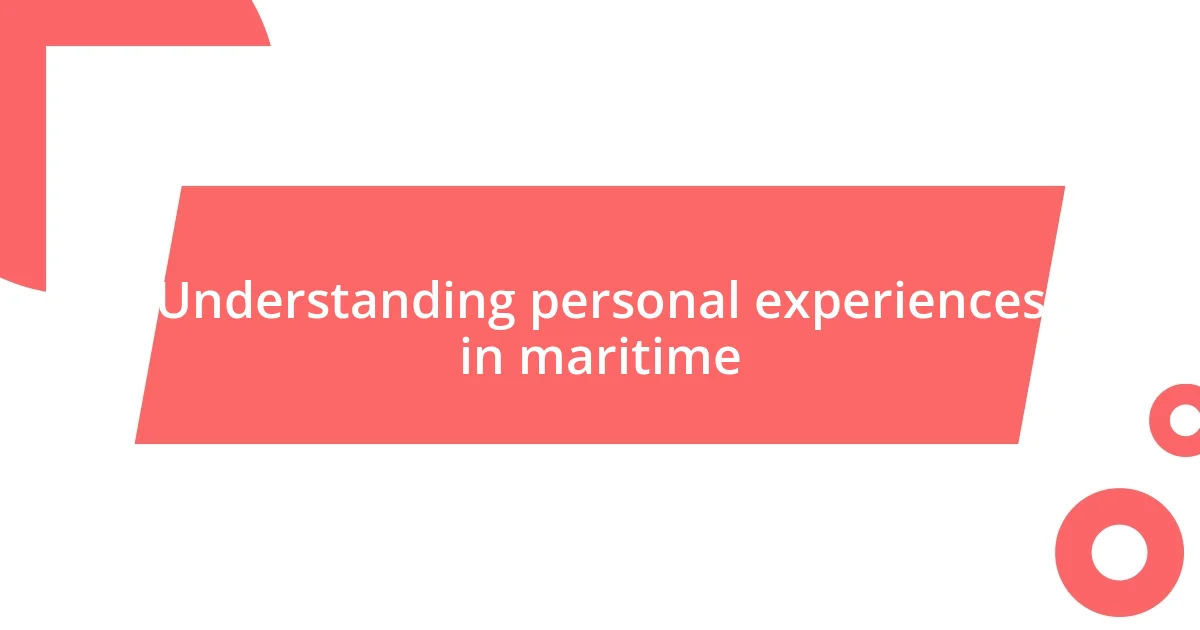
Understanding personal experiences in maritime
In my early days at sea, I vividly remember the first storm I encountered. The thrill of the rising waves and the deafening wind was both exhilarating and terrifying. How does one prepare for such chaos? It’s in these moments of uncertainty that our personal experiences truly shape our understanding of maritime life.
The friendships forged during those long nights on deck became more than just camaraderie; they were life lessons. I often think about how these shared experiences—navigating rough waters together—taught us resilience and trust. Have you ever relied on someone completely when everything feels so unpredictable? It’s those moments that embed a deep understanding of the maritime world within us.
Every mistake I made out there, from misreading a chart to mishandling a rope, contributed to my growth as a mariner. Each misstep taught me invaluable lessons, allowing me to appreciate the sea’s vastness and unpredictability. Surely, we’ve all had those moments that profoundly change our perspective, haven’t we? It’s through these personal trials that we learn to navigate the complexities of maritime life.
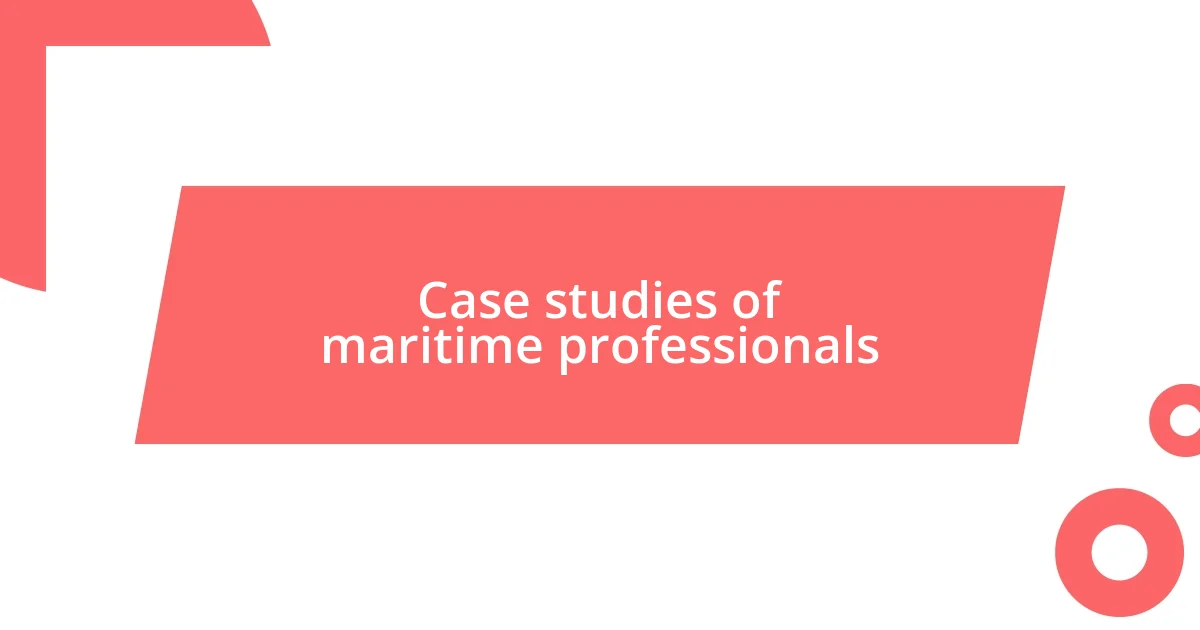
Case studies of maritime professionals
As I think about the diverse experiences of maritime professionals, several case studies come to mind. Take the story of a seasoned captain I once knew who navigated through treacherous Arctic waters. His ability to read the shifting ice packs was nothing short of extraordinary. This skill was honed from years stationed in those frigid environments, where personal intuition merged with formal training, drastically influencing his maritime insights. Isn’t it fascinating how one’s surroundings can shape one’s expertise so profoundly?
Another compelling example is a marine engineer who faced a catastrophic engine failure during a pivotal ocean race. The chaos that unfolded taught him the significance of prior maintenance checks. His recollections were filled with vivid emotions—the panic, the urgent communication with his crew, and ultimately, the relief after successfully managing the crisis. It’s stories like these that highlight how real-time experiences not only mold our skills but also build our character.
Tabletop exercises used by maritime training programs often draw from such personal anecdotes, enabling participants to relate and learn from real-world scenarios. This approach fosters a deeper understanding of maritime challenges and enhances problem-solving capabilities. By sharing these experiences, professionals cultivate a community of knowledge. It makes me wonder—how many of us recognize the sheer value of shared stories when tackling complex maritime situations?
| Maritime Professional | Key Experience |
|---|---|
| Captain in Arctic Waters | Navigated through shifting ice packs; honed skills through personal intuition and environmental influence. |
| Marine Engineer in Ocean Race | Managed a critical engine failure, emphasizing the importance of maintenance and crisis communication. |
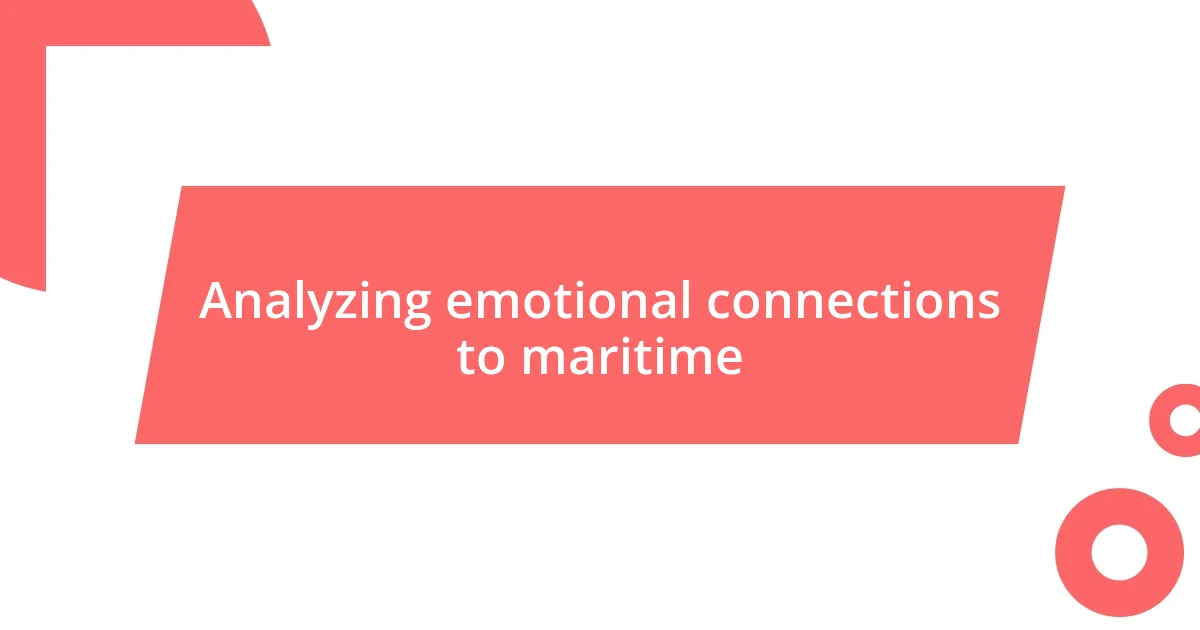
Analyzing emotional connections to maritime
When I reflect on my time at sea, I realize that the emotional connections I formed with the ocean were as profound as the experiences themselves. Watching the sun dip below the horizon, colors erupting in the sky, instilled a sense of peace that would wash over me, contrasting the turbulence of earlier storms. These moments tether us to the maritime world, creating an emotional landscape that shapes our understanding and appreciation of the sea.
- Memories of laughter while navigating through rough patches with my crew solidified our bonds, causing every challenge to feel manageable.
- The scent of salt and seaweed, a sensory reminder of home, evokes nostalgia and a deeper connection to the ocean’s beauty.
- I’ve often found myself lost in thought, contemplating my place in the vastness, realizing how small our troubles seem in the grand scope of the maritime world.
It’s these emotional threads, woven through my experiences, that create a rich tapestry of understanding—one that echoes in my heart long after I leave the sea behind.
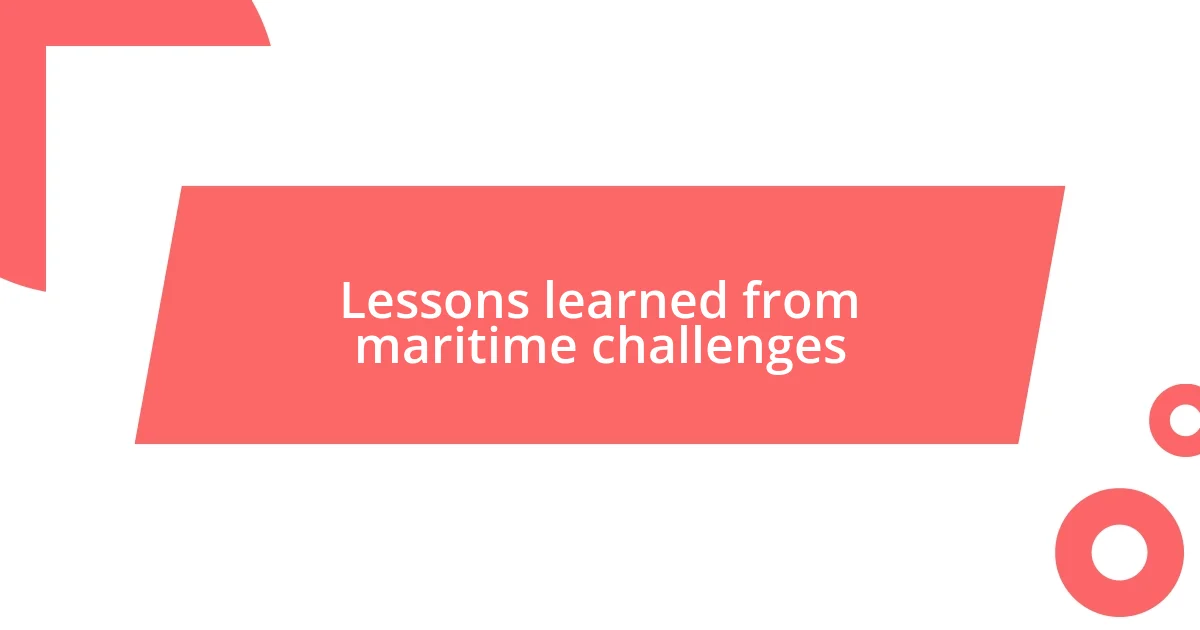
Lessons learned from maritime challenges
Taking a leap into the unknown often leads to the most impactful lessons. I remember a challenging voyage where sudden storms caught my team off-guard. We were ill-prepared, and the sheer chaos taught us the importance of rigorous pre-voyage planning. It was a lesson that resonated deeply: preparation isn’t just a formality; it’s a lifeline. Don’t you think that every storm can shape not just our skills but also our mindset for future endeavors?
In another instance, I recall the time I misjudged a tide while docking. The thud of the vessel against the fender still echoes in my mind. That experience schooled me in humility and adaptability. I learned that even the most experienced mariners can err, and it’s how we respond to those mistakes that truly defines us. Reflecting back, I see these moments not as failures, but rather as stepping stones toward becoming more adept.
And those late-night shifts, when fatigue looms heavy, taught me the value of teamwork. I’ve seen how leaning on a trusty crew to share the burden makes the toughest nights bearable. In such moments, camaraderie becomes our greatest asset. It’s a stark reminder that maritime challenges are often best faced together, wouldn’t you agree?
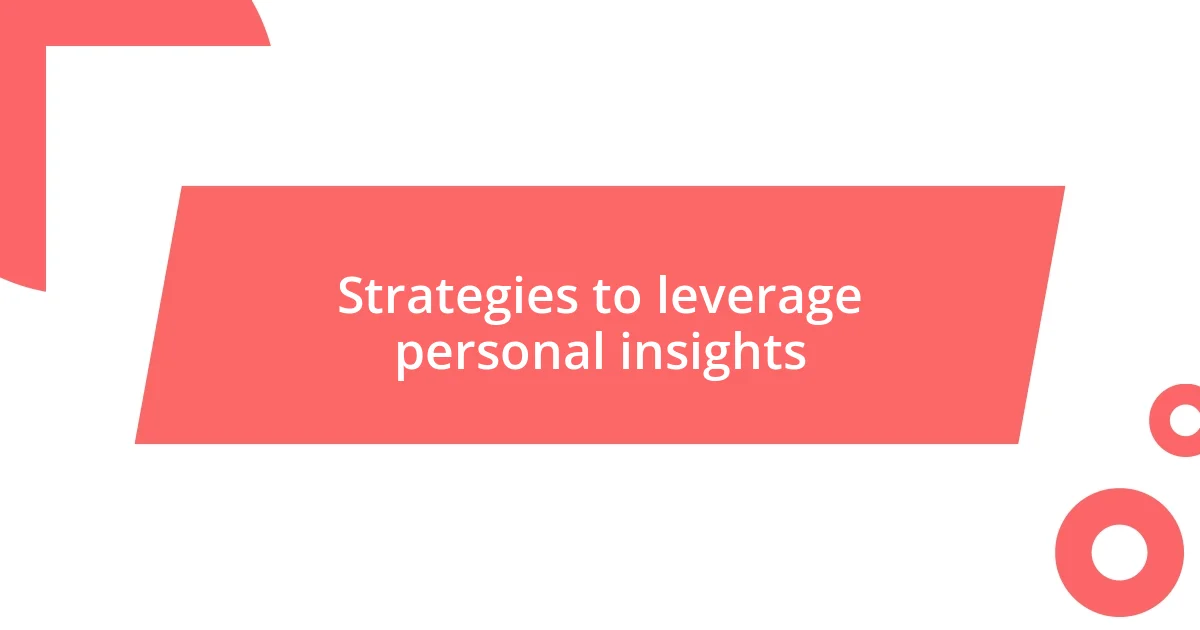
Strategies to leverage personal insights
To harness personal insights effectively, I advocate for keeping a reflective journal. By writing down experiences, thoughts, and feelings related to my maritime journeys, I can easily sift through memories that hold significant lessons. It’s like creating a treasure chest of knowledge, where every entry reveals facets of my adventures that inform future decision-making. Have you ever considered how revisiting your past can illuminate your present mindset?
Additionally, sharing experiences with peers can deepen understanding. I often gather insights from fellow sailors, exchanging stories that highlight contrasting perspectives on similar challenges. Each conversation acts as a mirror—showing me not only my growth but also new angles on long-standing issues. This collaborative approach allows for a richer grasp of nuances within the maritime world. Isn’t it fascinating how our personal narratives intertwine to reshape our collective insight?
Finally, I find that mindfulness practices—like simply sitting quietly by the shore—help amplify these insights. By connecting deeply with my surroundings, I experience moments that clarify my thoughts and emotions. This connection often transforms how I view prior experiences, influencing my approach to anticipated challenges. Do you take the time to pause and truly engage with your environment? Those moments of stillness can yield remarkable revelations.

Future trends in maritime decision-making
Future trends in maritime decision-making are increasingly leaning towards data-driven approaches. The advent of big data analytics has revolutionized how we interpret maritime operations. During my last few voyages, I noticed how utilizing real-time data helped us navigate treacherous waters more effectively. Have you ever wondered how a single data point can alter your entire route? It’s incredible what a simple weather forecast or a tide report can do for decision-making on the water.
Moreover, I believe that artificial intelligence (AI) and machine learning will soon play pivotal roles in maritime strategies. I witnessed a demo of an AI system that could predict potential disruptions based on historical patterns. It left me both excited and apprehensive. How often do we trust machines with the critical decisions that could impact lives and cargo? I think it’s vital that we remain at the helm, using these tools as assistants rather than replacements for our intuition.
Collaboration will also redefine the future landscape of maritime decision-making. I often reflect on my experiences in joint ventures where diverse teams from various backgrounds came together. It wasn’t just about sharing the workload; it was about merging different perspectives. As we embrace a more interconnected maritime world, how will we ensure that every voice is heard? I’m convinced that by blending individual insights and collective expertise, we can navigate the complexities ahead with greater agility and foresight.









